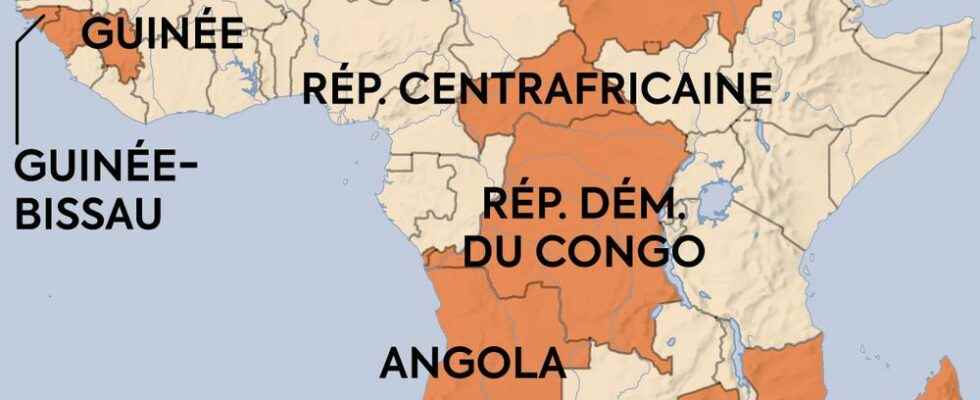At the beginning of March, the sun shines on the golden fountains of the sumptuous Peterhof Palace, on the outskirts of Saint Petersburg. At a time when bombs are raining down on Ukraine, the “Russian Versailles”, former residence of Peter the Great, welcomes a distinguished tourist. Duduzile Zuma, the daughter of former South African President Jacob Zuma, strikes a pose, incognito.
Sunglasses on her nose, the young woman waves the V for victory with her left hand. His selfie, with the hashtag #IStandWithRussia (JeSuisAvecLaRussie) and the Russian flag, will be shared on Twitter to his 200,000 followers. A turnkey advertisement for Vladimir Putin, neither more nor less than “the president of the world”, according to the Zuma girl.
Other African Internet users see in him a “hero”, defender of the oppressed against the colonizing “West”. “Two hashtags emerged on social networks in the early hours of the war, explains British researcher Carl Miller, co-author of a study on the subject for the Center for the Analysis of Social Media: #IStandWithRussia and #IStandWithPutin. These messages flew under the radar in the West, where indignation and sympathy for Ukraine dominate. But when we started our research, a whole other world opened up before our eyes.”
In this parallel reality, pro-Russian comments mingle with criticisms of the “hypocrisy” and “double standards” of Westerners and with bogus photos of Putin in fatigues alongside African independence leaders. Content relayed by real accounts, suspicious profiles and false identities. An index, according to Carl Miller, of a vast operation of Russian influence targeting the countries of the South. In the viewfinder, Africa, a continent coveted for ten years by Moscow, in search of new allies and alternative markets.
“Africa took on a capital importance from the 2010s in Putin’s strategy aimed at rectifying the borders of his State, recalls Arnaud Kalika, director of the Russia seminar at the National Conservatory of Arts and Crafts. Russian president is anticipating Western sanctions and looking for plans B.”
The annexation of Crimea in 2014 has an accelerator effect. The special envoy for Africa, Mikhaïl Bogdanov, goes there 50 times from 2014 to 2019; Russian oligarchs jostle in presidential palaces. Putin’s unofficial VRP, Evgueni Prigogine, multiplies the round trips to sell the services of Wagner’s paramilitaries and infiltrate the local media in passing to influence an election – in Madagascar, for example – or broadcast, in the Central African Republic or in Mali, a little anti-French music.
Dario Ingiusto / L’Express
Wheat, military cooperation…
Thanks to the war in Ukraine, the master of the Kremlin is now counting the points scored. A first indication falls on March 2, during the vote of a resolution at the General Assembly of the UN denouncing “the aggression against Ukraine”. Of the 54 African States, 17 abstain; a dozen do not attend the vote. The cold shower for Westerners. “We forced several countries to vote for them. In the end, we don’t even reach the average!, creaks a close friend of Emmanuel Macron. They wonder what they have to gain and lose…”
In fact, the map of the abstentionists – who claim their neutrality, in the tradition of the non-aligned – relates in part to the friendships forged with Moscow. It must be said that the Kremlin has taken care to target strategic sectors in recent years, like wheat. From 2018 to 2020, Africa imported $3.7 billion from Russia, or 32% of total imports of this cereal.
But the flagship product of Putin’s “catalogue” remains military cooperation. Almost half of the continent’s states have reached an agreement with the Kremlin. Algeria is its first client, which has doubled its military spending since 2010. “Europe therefore has a country on its southern border whose entire security system is run by the Russians,” sums up our source.
Thousands of tons of gold
That’s not all. Alongside official partnerships, the private military company Wagner has also won over failed states. The leaders of Mali, the Central African Republic and Sudan now rely on these mercenaries, a sort of praetorian guard, to retain power. And they acquired these “little green men” in exchange for mining and gold concessions. Enough to bail out the Kremlin’s gold reserves to free itself from the dollar and, when the time comes, face economic sanctions.
Mission accomplished, according to World Gold Council data : the vaults of the Russian Central Bank housed, at the end of 2021, nearly 2,300 tonnes of gold… five times more than fifteen years ago! Sudan, the continent’s third-largest producer, probably has something to do with it. The strongman of the country, General Daglo, is said to have loaded ingots himself on his last flight to Moscow for an official visit on February 23 (on the eve of the invasion of Ukraine), it is believed. CIA analyst Cameron Hudson briefed by delegation member.
To take care of its image with its African clients, Russia willingly recalls the happy Soviet days, when the USSR sponsored the national liberation movements. Above all, it capitalizes on resentment towards the West. “Africa has a memory. It remembers NATO’s intervention in Libya against Gaddafi or the invasion of Iraq”, slips Jean-Yves Ollivier, a French businessman close to the Congolese president, close to the Russian business circles.
Moscow plays this card thoroughly to advance its pawns. Putin knows it: manganese and bauxite, two minerals essential to Russian industry, will soon run out. That’s good, Africa is full of them.
